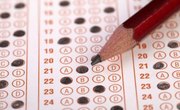Types of Intellectual Skills
How do we think and understand? Looking at specific intellectual skills that define our thought processes and ideas can answer that question and give insight into the human mind. Intellectual skills are defined as the methods an individual can use to evaluate or organize information and data. In the 1950s, educational psychologist Benjamin Bloom created a model of intellectual skills that defined abilities such as application, analysis and synthesis as building on basic knowledge. Since then, different psychologists have used multiple models and approaches to understand intellectual skills. However, a few types of skills, such as problem solving, are commonly used in a wide variety of intellectual disciplines.
Cognitive abilities, or cognitive skills, also allow for intellectual skills to be shared and gained through decision making and other intellectual abilities. Intellectual skills also rely on reasoning skills and thinking skills in many processes, as well as communication skills and deductive reasoning within its correlations. Physical activity, as well as mental activity, can help improve a person’s intellectual skills as well as their motor skills, industriousness and certain problem-solving skills, social sciences and information processing in their learning outcomes.
Knowledge and Understanding
Learning about intellectual skills is often distilled down into Bloom's Taxonomy. It is likely you have studied or applied Bloom's ideas in school or at work. In Bloom's system, the most basic forms of intellectual skills were defined as knowledge and comprehension. Knowledge is defined as the ability to memorize and reproduce information. Comprehension builds on knowledge and is the ability to understand what memorized information means. For example, memorizing that two plus two equals four is a use of knowledge as a skill. However, knowing that two of an object plus two of an object equals four of an object is comprehension or the simple understanding what the parts of the formula mean. Processing skills help in this area of intellectual skills as your mind becomes adaptive within reasoning, like verbal reasoning.
Critical Thinking
One commonly recognized intellectual skill is critical thinking, which is the ability to analyze and interpret information to assess its context and validity. This can include multiple specific skills: asking questions about information, comparing material to known information and drawing connections between information and its context to for analysis. Graphs are a great example of using your intellectual critical thinking, as you have to analyze the information presented for deeper meaning, and this is normally a skill taught in high school.
Bias
Checking for intellectual bias is an important aspect of critical thinking. Some psychologists connect critical thinking to an additional intellectual skill of determining if a preconceived bias in present. This is sometimes referred to as disinterested scholarship: the ability to distance oneself from material or information being presented to evaluate its validity. Many university courses are offered on the study of bias in the real-world. Student’s can even get their Bachelor’s degree by learning all about intellectual skills in their specific field of study.
Problem Solving
Another set of intellectual skills is problem solving. Where critical thinking involves analyzing and evaluating information, problem solving involves an individual using intellectual skills to solve situations she is not familiar with. Psychologists have connected multiple intellectual skills to problem solving: analyzing the problem, using information to come up with potential solutions and testing solutions empirically. Other skills related to problem solving include setting goals and planning different ways to approach the problem. In each case, these skills involve relating the information of the problem to multiple sets of known information and finding a way to creatively synthesize that information with the problem; this makes problem solving one of the most complex forms of intellectual skills.
Creative Skills
While problem solving and critical thinking involve using intellectual skills to understand and solve exterior information, intellectual skills can also be used creatively. In fact, some 21st century educational psychologists have modified Bloom's taxonomy to show creating as the most developed intellectual skill. Different intellectual skills connected with creativity involve synthesis. When combining multiple sources of information and fluency, the ability to create quickly from limited information comes from that synthesis. Originality, the skill to create distinctive solutions, and flexibility, the skill to alter and revise information given changing circumstances, are also important skills in the creative process.
Related Articles
References
Writer Bio
<!--StartFragment-->I am a current senior studying at the University of Missouri - Columbia with a major in Journalism and a minor in Sociology. I have interests in photojournalism, documentary journalism and design fields. <!--EndFragment--><!--EndFragment--><!--EndFragment-->









